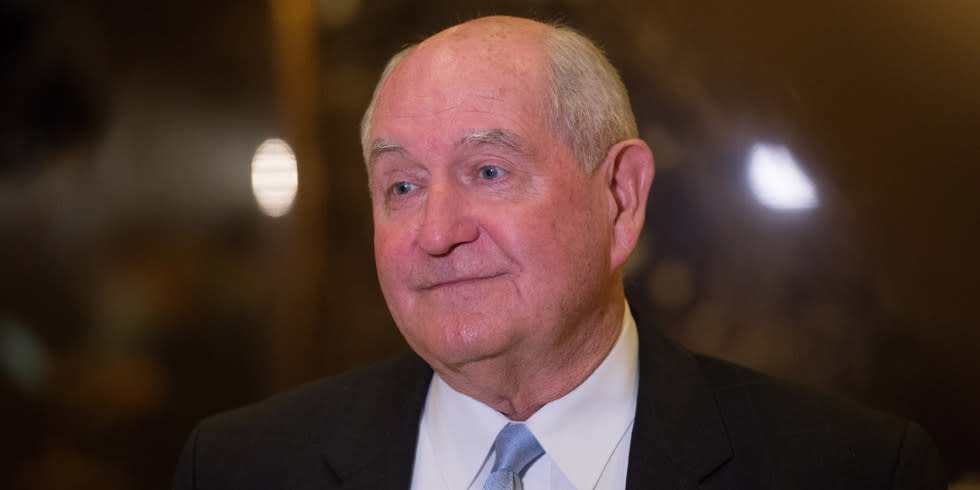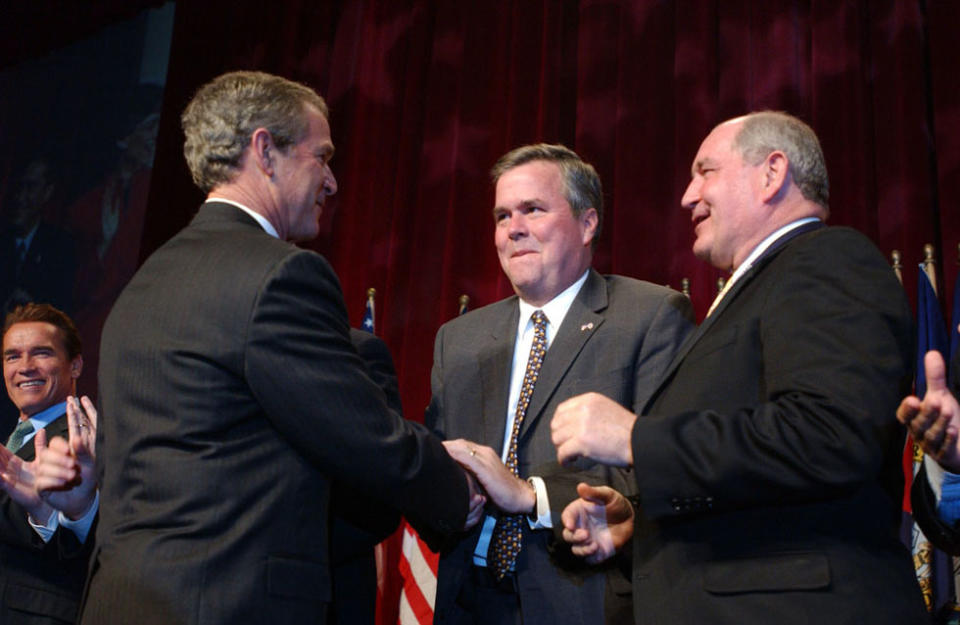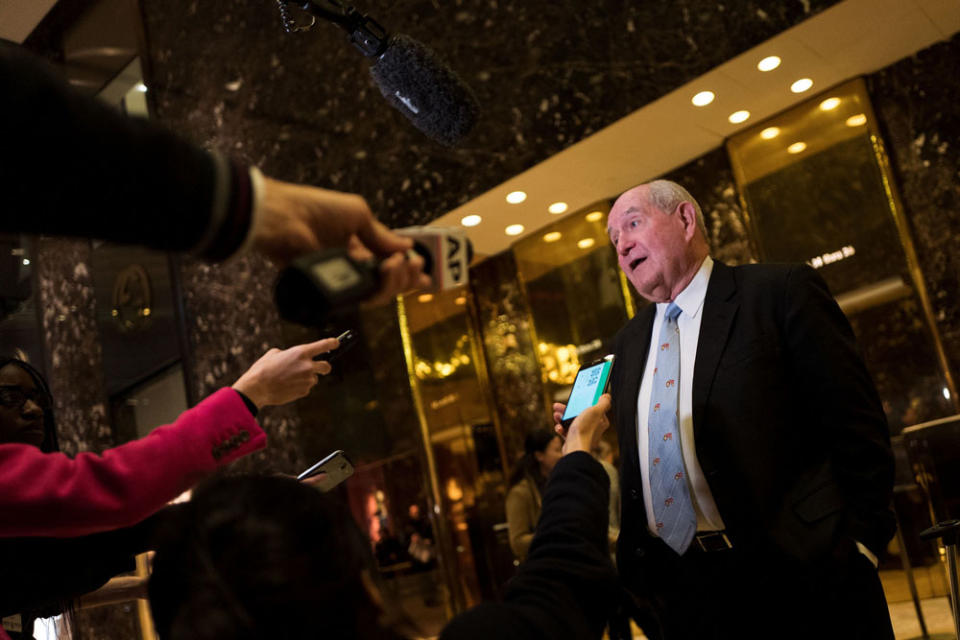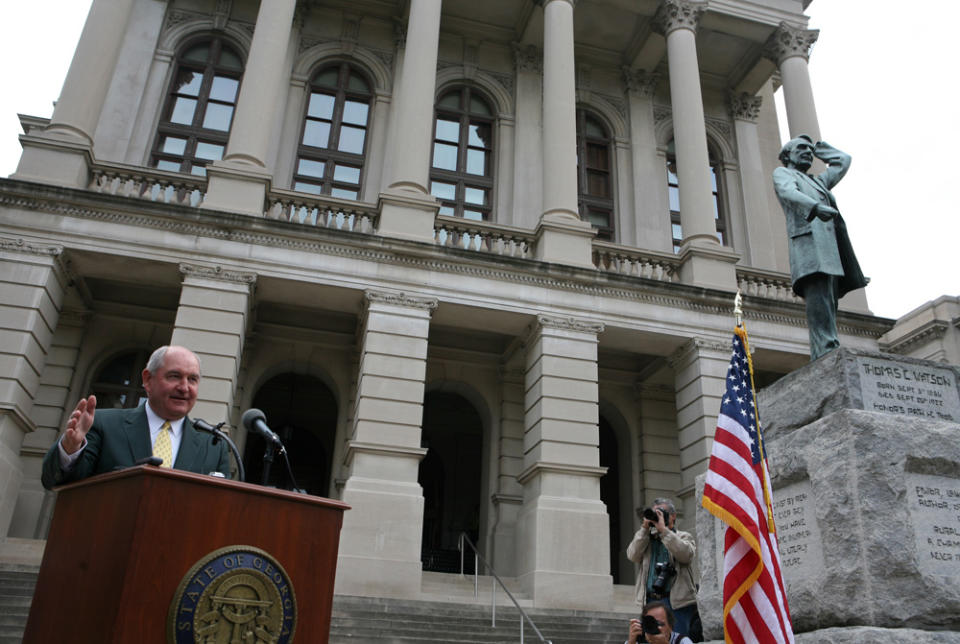10 Things You Need to Know About Sonny Perdue

Donald Trump's agriculture secretary, Sonny Perdue, was confirmed April 24, 2017, and he will have a wide reach in his role. The Department of Agriculture isn't flashy, but it's huge, with close to 100,000 employees and an annual budget of $155 billion, although it is poised to lose $4.7 billion in discretionary funding under Trump's proposed budget. The agency does everything from supporting farmers, to contributing to food safety and environmental initiatives, to supporting free trade. The USDA also administers the SNAP program and, since the agricultural sector tends to depend on immigrant labor, immigration policy is an important issue for the department as well. Here are 10 things you need to know about Perdue.
1. He was governor of Georgia for eight years and he has a background in agriculture.

Perdue graduated from the University of Georgia in 1971 with a doctorate in veterinary medicine, before serving as a captain in the Air Force. Perdue then moved into the business world, starting small businesses related to agriculture and transportation. He is not, however, related to or affiliated with Perdue Farms, the company behind Perdue chicken.
He began his political career as a Democrat and spent time with the party in the Georgia state legislature before running as a Republican for governor.
From 2003 to 2011, Perdue served two terms as governor of Georgia. Following his time in office, Perdue continued his work in agribusiness. In 2011, he launched Perdue Partners, LLC, a global trading company.
2. He hasn't always been a Trump supporter.

Perdue wasn't always a fervent member of Team Trump. In the 2016 presidential race, he endorsed Mike Huckabee and then, later, Jeb Bush, before finally voicing his support for the now-president.
3. As governor, he dealt with several ethics controversies.

When Perdue took office as governor of Georgia in 2003, he refused to put his businesses in a blind trust, in which a third party would have managed his assets while he was in office and he wouldn't have been privy to key information.
You've probably heard a lot about blind trusts and elected officials in the past. In 2012, then-presidential candidate Mitt Romney came under fire for putting his millions in a "blind" trust that was run by his personal lawyer and close friend, Bradford Malt. More recently, Donald Trump's plan to put his assets into a "blind" trust, to be managed by his oldest sons, has been criticized by ethics experts.
"The plan the President-elect has announced doesn't meet the standards that the best of his nominees are meeting and that every President in the past four decades has met," director of the U.S. Office of Government Ethics Walter M. Shaub Jr. said. What's more, many have pointed out that Trump's plan doesn't even qualify as a blind trust.
Perdue's decision to forgo any kind of blind trust led to several conflict-of-interest issues for him during his time in office. "I am a small business owner, I’m in the agri-business," Perdue said when he was up for reelection in 2006. "That’s about as blind a trust as you can get. We trust in the Lord for rain and many other things."
During his time in office, the Georgia State Ethics Commission investigated 13 complaints against Perdue, though he was only found to have violated ethics laws in two of those instances. In 2005, the Commission fined him $1,900 for failing to report a campaign trip made on a private plane owned by one of his family's businesses. The same commission also required him to return more than $18,000 in campaign contributions. Perdue and his lawyers described these as minor infractions.
"The governor decided that rather than look for an easy way out ... [he would seek] to elevate the standards for office holders in the state, even if that means for him personally doing things that cost him money," Perdue's lawyer, Randy Evans said at the time.
Although Perdue refused to put his assets in a blind trust as governor, he has promised to do so if confirmed as secretary of agriculture. He has also agreed to resign his positions running holding companies in Georgia.
4. His confirmation hearings were held up because his ethics paperwork has been under review.
Trump announced Perdue as his pick for agriculture secretary back in January, but his official nomination process has been held up, mostly because his ethics paperwork has been delayed.
White House Finally Sends The Senate Some Paperwork On Sonny Perdue https://t.co/jHviIug8zA pic.twitter.com/nKTrm2sexS
- The Daily Caller (@DailyCaller) March 12, 2017
It took Perdue seven weeks to compile the required financial disclosure documents to move forward with his nomination. The Senate finally received his ethics disclosure forms March 10 and his confirmation hearing occurred on March 23.
5. He has a reported history of rewarding friends and donors with appointments.

As governor, Perdue gave appointments to business associates and campaign donors more than a dozen times, according to a Politico investigation. He also rewarded state staff members with positions in his agriculture and shipping businesses after his time in office.
What's more, Politico found that he has continued this pattern. In January 2017, Heidi Green, a longtime Perdue associate (she's worked with him in his shipping business and in the Georgia state government), was appointed as a senior adviser in the USDA, a job Perdue "lined up" for her according to the Politico report. She's also considered a frontrunner to serve as Perdue's chief of staff.
6. As governor, his budget cuts were linked to food-borne health issues in Georgia.
As governor of Georgia, Perdue cut the state budget drastically, including major cuts to the state's agriculture department. These cuts impacted Georgia's food safety and inspection unit and were linked to two salmonella outbreaks in the state.
The deputy commissioner of Georgia's Department of Agriculture said that the conditions that led to these health hazards should have been caught during inspections, but the department lacked the necessary funds to do adequate checks. Both incidents led to large-scale recalls of peanuts in Georgia and the second was linked to nine deaths.
7. He's unlikely to prioritize environmental issues as agriculture secretary.
Under the Obama administration, environmental issues were prioritized in the Department of Agriculture. Given Perdue's history of supporting Big Ag and his past comments on climate change, it seems unlikely that he'll continue that tradition.
"It’s become a running joke among the public, and liberals have lost all credibility when it comes to climate science because their arguments have become so ridiculous and so obviously disconnected from reality," he wrote in National Review.

As governor, he once famously prayed for rain, holding a public vigil for the occasion. “We’ve come together here simply for one reason and one reason only: To very reverently and respectfully pray up a storm,” Perdue said to the few hundred people who turned out for the prayer. The state continued to suffer from its drought for months afterward.
8. He used to take a very conservative stance on immigration, but he's since softened.

In 2006, Perdue signed a law that made Georgia one of the toughest states on undocumented immigrants. The law required that adults seeking state benefits prove they were in the country legally, punished employers who knowingly hired undocumented immigrants, and forced any company with a state contract to verify its workers' immigration status.
When he signed the bill, Perdue said, "I want to make this clear - we are not, Georgia's government is not, and this bill is not, anti-immigrant. We simply believe that everyone who lives in our state needs to abide by our laws."
By 2010, however, Perdue took a softer stance on immigration, warning other conservatives to avoid a "gang-type mentality" about undocumented immigrants. “The Republican Party needs to be very, very careful that it maintains the golden rule in its rhetoric regarding immigration policy,” Perdue told the Associated Press, adding that making people of color and people who are not U.S.-born feel welcome is a challenge facing Republicans.
9. Some see him as a potential voice for trade in the Trump administration.

For some who disagree with the Trump administration's stance on trade, Perdue is something of a glimmer of hope. Bob Young, chief economist at the American Farm Bureau Federation, for example, has spoken out about his optimism that Perdue will be a proponent of free trade within the administration.
“He's run businesses on farm inputs - fertilizer sales, for example. [He’s] also run a business basically set up to promote trade of agricultural products,” Young said. This stance isn't surprising in a pick for agriculture secretary, as trade has always been an important issue for the U.S. agriculture industry.
As the Washington Post reports, the American Farm Bureau Federation is a big supporter of the Trans-Pacific Partnership and has written that “annual net farm income will increase by $4.4 billion, driven by an increase of direct U.S. agricultural exports of $5.3 billion per year upon full implementation of the TPP agreement.”
Trump is opposed to the Trans-Pacific Partnership and in January, he signed an executive order withdrawing the United States from the deal.
10. Despite the delay, he was confirmed fairly easily.
ICYMI: The Senate Ag Committee will hold a hearing on 3/23 for USDA Secretary nominee, former GA Gov. Sonny Perdue. https://t.co/LZwZczwtW6 pic.twitter.com/FWORDIusG4
- Sen. Ag Republicans (@SenateAgGOP) March 17, 2017
Perdue's confirmation may have been delayed, but it wasn't suspected to face much opposition in the Senate. He garnered support from Republicans and Democrats alike, and has been endorsed by more than 600 agricultural organizations.
For some Democrats in states whose economies depend heavily on agriculture, like Heidi Heitkamp of North Dakota (who was rumored to be on Trump's short list for the position herself), Perdue feels like a good fit. In February, Heitkamp became the first Democrat to publicly endorse his appointment.
Met w/Gov. Perdue, nom. to lead @USDA & highlighted bipar. bill I re-introduced to expand ag exports to Cuba & need 4 strong #FarmBill pic.twitter.com/39S01aloc3
- Sen. Heidi Heitkamp (@SenatorHeitkamp) February 6, 2017
After mtg w/Gov. Perdue today, I look forward to voting for him for this imp. post & working w/him to get results for ND farmers & ranchers
- Sen. Heidi Heitkamp (@SenatorHeitkamp) February 6, 2017
“Farmers and ranchers are the backbone of North Dakota’s economy, which is why I take this nomination so seriously,” Heitkamp said.
After his confirmation hearing, Sen. Debbie Stabenow, a Democrat on the Senate Agriculture Committee, also indicated she would support Perdue's confirmation. "We have a nominee who understands agriculture, grew up on a dairy farm, and after multiple discussions with him, I feel that he can do a good job of running the department,” she said. “Barring anything that comes up in questions for the record and so on, I’m planning on supporting him.”
It's also worth noting that Perdue is a first cousin of Georgia Sen. David Perdue, who actually serves on the Senate Agriculture Committee.
“I could not be more proud of my cousin, Sonny, for being named the next Secretary of Agriculture," David Perdue said in a statement responding to Sonny Perdue's nomination. "I am confident Sonny will work hard to advance smart agriculture policies that will help our farmers, ranchers, and rural communities across the country.”
On April 24, he was confirmed by a vote of 87–11.
This article was originally published on March 27, 2017, and has been updated.
You Might Also Like
